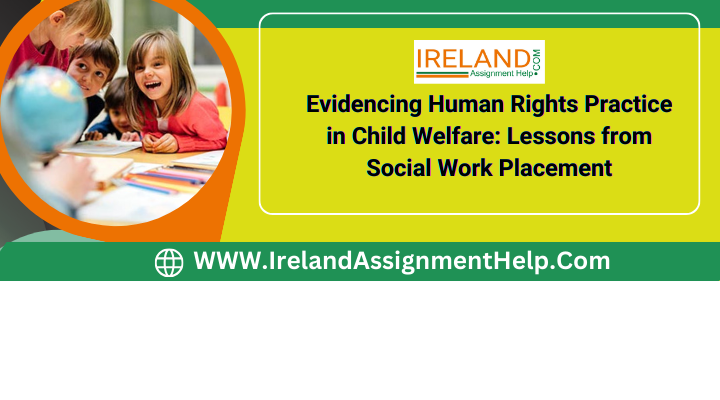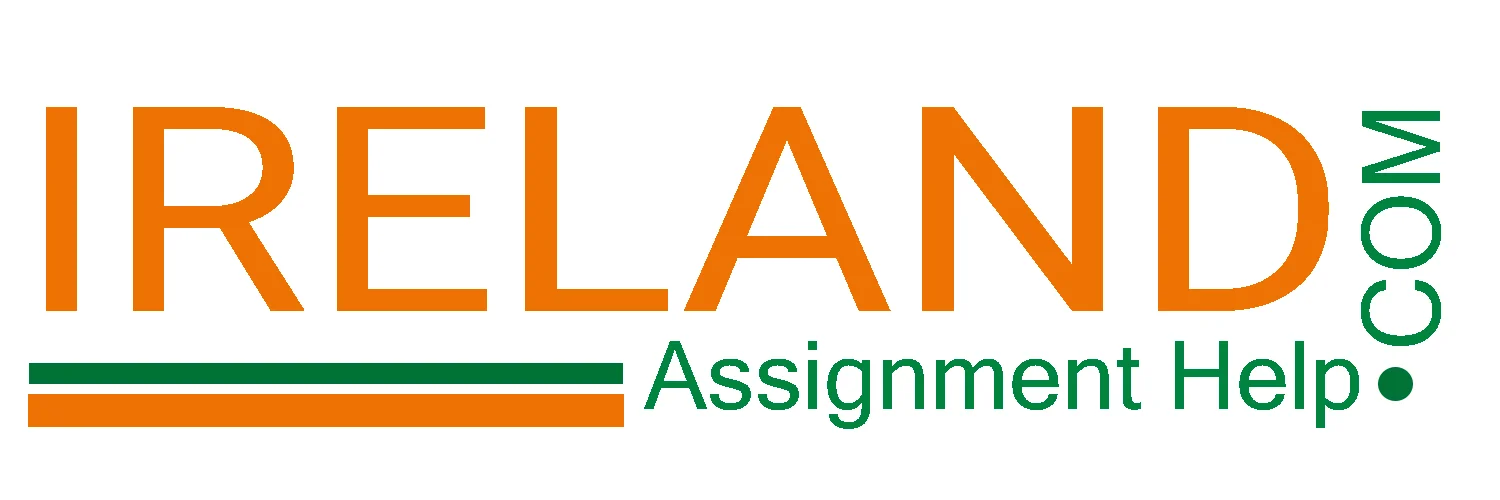Evidencing Human Rights Practice in Child Welfare: Lessons from Social Work Placement
The relationship between child welfare and human rights is fundamental to social work practice in Ireland. It is a theoretical and practical need for students of social work to know how to demonstrate human rights in child welfare at the start of their practicum.
Intending to ensure that children’s rights are protected and their welfare is put first, social work placements provide a priceless opportunity to link theoretical knowledge with practical application.
This blog looks at essential learnings from social work placements, offering insights that are in line with Ireland’s legal and ethical frameworks, whether you are a prospective social worker or an academic student.

Acknowledging Human Rights’ Contribution to Child Welfare
Among the several national and international frameworks that recognise and uphold human rights, the United Nations Convention on the Rights of the Child (UNCRC), ratified by Ireland in 1992, is among them.
Placements in social work provide a context where one can watch and practice such rights. It will be expected of you as a student to identify, respect, and promote the rights of children, such as the right to education, security, or participation in decisions that would alter their lives.
Placements provide a source of living ideas brought forth in realising the balance between the protection and empowerment of children.
Learning From The Social Work Placement
1. Developing Relationships with Families and Children
Social work placements emphasise how important it is to establish bonds and trust with families and children.
Their views are listened to and heard when a child-centred approach is implemented. Practical illustrations of a rights-based approach to welfare include involving the children in care plans and implementing age-appropriate communication methods.
2. Identifying and Addressing Vulnerability
Students often encounter children who are at risk because of factors such as poverty, abuse, or neglect while on placement. One of the most important components of demonstrating human rights practice is to identify these vulnerabilities and take appropriate action.
Scared with Looming Deadline, Buy Plagiarism Free Paper Writing Services Now
This includes adhering to Ireland’s child protection policies, working in conjunction with interprofessional teams, and conducting risk assessments.
3. Managing Ethical Problems:
Social work placements may require managing ethical problems. It does take ethical judgment and critical thought to manage when the immediate needs of a child come into conflict with long-term objectives or finding a balance between the rights of the child and the rights of the parents.
Placements enable students to discuss these challenges under close supervision to equip them to prepare for eventualities in the future.
4. Applying laws and policies:
Irish social work students must be familiar with key legislation such as the Child Care Act 1991 and the Children First Act 2015.
Placements allow students to learn by doing how these laws are applied in real life. Students can demonstrate their knowledge of their statutory obligations by being involved in activities that align with these legal frameworks or by attending case conferences.
5. Advocacy and Documentation
Proper advocacy skills and proper documentation are required to prove human rights practices.
In addition to advocacy for the best interest of the child, this will impart knowledge on how to maintain records indicating commitment to human rights standards.
This involves writing reports, making arguments, and effectively interacting with stakeholders. This includes writing reports, presenting cases, and impactfully communicating with stakeholders.
Get 100% Unique Assignment Papers for Your College & Get Good Grades
The Challenges for Irish Social Work Students
Even though social work placement is fun, one has to encounter hindrances. Academic students always find it challenging to stick to their schedules while balancing their placement responsibilities with their academic coursework.
In addition, one gets to face very demanding child welfare issues that are emotionally draining and require self-care methods and resilience.
Supervisory support and reflective practice are two critical resources that would overcome these obstacles to ensure students develop professionally and personally.
Best Practices for Showing Human Rights Practices
Irish students should implement the following best practices to successfully show human rights practices during social work placements:
Participate in Reflective Practices: Reflect on your experiences every day to come up with what your strengths are and what areas require improvement, whether your actions or behaviour uphold human rights values or not.
Stay Informed: Keep track of the alterations to the law regarding child care, policies and procedures in Ireland.
Seek feedback: This will help to enhance your skills and professional practice by actively getting comments from coworkers and your superiors.
Practice Self-Care: Recognise the emotional costs of social work and take practical steps to be healthy.
Enhance Cultural Competence: Ensure practices are inclusive and equitable, with an understanding and respect of the varying backgrounds of the kids and families to whom you deliver services.
Hire an Irish Assignment Writer to Write your Essay, Thesis & Other Academic Papers
Why Should You Show Trust In Ireland Assignment Help Writing Services?
Exhausted with assignments related to human rights practice or social work placements? Ireland Assignment Helpers are here to help you with your Ireland assignment! We guarantee your academic success by providing customised essay writing services and knowledgeable advice on difficult topics. We want to ensure your success through timely submission, AI-free content, and native Irish writers. Get in touch with us today for unmatched help, and let us take the burden out of your academic path!
Frequently Asked Questions (FAQs)
Well, they’re really the backbone of everything social work stands for. Every action — from listening to a child’s worries to writing a care plan — ties back to basic rights like safety, dignity, and participation. Without that lens, it’s easy to slip into “doing for” rather than “working with”. In Ireland, especially, most placement agencies remind students that rights aren’t theory; they’re lived day to day through small, respectful choices.
It’s about putting people’s rights at the heart of every decision. In child welfare, that means not just protecting children but actually involving them — hearing what they want and weighing their voice seriously. On placement, it often looks like balancing safety plans with empowerment, making sure the child’s story isn’t lost in paperwork. It’s practical empathy, not just policy talk.
They go hand in hand, to be fair. Social work’s all about social justice, equality, and giving people a fair shot — which are all human rights principles. Whether it’s housing, education, or child protection, the same idea runs through: every person deserves respect and opportunity. Placements make that connection real because you actually see where those rights succeed or, sometimes, fail.
4. What are the five important aspects of human rights protection?
You’d usually hear protection, participation, equality, empowerment, and accountability mentioned most. In practice, it’s things like making sure kids are heard in case reviews, treating families fairly, and challenging systems that disadvantage them. On placement, those five words become actions — small, steady habits that keep welfare work grounded in respect.
Core principles include respect for dignity, advocacy for the vulnerable, equality, and responsibility to challenge injustice. Irish placements often highlight reflective practice too — asking, “Did that decision uphold rights, or did it ignore them?” It’s less about ticking ethical boxes and more about staying human while working in tough systems.
Things like the right to education, the right to housing, the right to health care, and the right to family life — all count as social human rights. In placements, students often see how unevenly those rights are met. Supporting a young person to access school again or helping a parent find safe housing — that’s human rights in motion, not theory.
7. Can someone help me do my assignment on evidencing human rights practice in child welfare?
Yeah, that’s no bother at all. Many social care and child welfare students get expert help to link theory with real-life case examples. Services like Ireland Assignment Help can guide you through structure, referencing, and QQI or degree standards while keeping it 100% original and Turnitin-safe. It’s proper academic support, not cheating.
Focus on practical moments—like explaining your approach to listening to children at a Cork community service. Short anecdotes about trust-building, communication, or family meetings really show you understand the human rights aspect in action.
9. Can someone write my reflective journal for child welfare placements in Ireland?
Yeah, sure. Honestly, just write about what you actually did on placement. Like, in UCD, a child was having trouble being heard at a care meeting, and you made sure his voice was included—that’s a simple, real example of human rights practice.
Describe concrete steps you took, like conducting risk assessments or identifying children at risk of neglect. Mention working with interprofessional teams in HSE settings—it shows you know how theory meets practice.
12. How do I include Irish child welfare laws in my human rights assignment?
Link practice to legislation like the Child Care Act 1991 or the Children First Act 2015. For example, describe attending a case conference and how you applied your understanding to support the child. Short, clear examples make your paper much stronger.
13. How do I show evidence of my work in reports and advocacy?
You can talk about writing short updates for your supervisor or explaining a child’s needs in a team meeting. Even small things, like using the HSE templates correctly, count as evidence, and it makes your work feel real and grounded.
14. How do I reflect human rights practice in my QQI placement assignment?
Think about daily activities—did you include children in decisions about their care? Reflect on how you respected their views and rights. Simple reflections like these, with placement-specific examples, resonate with lecturers more than generic theory.
Be honest. Discuss time management strategies, using supervisory support, and reflective journaling. Mention your own experience or a hypothetical scenario from a Cork or Dublin placement—it keeps your assignment human and relatable.


